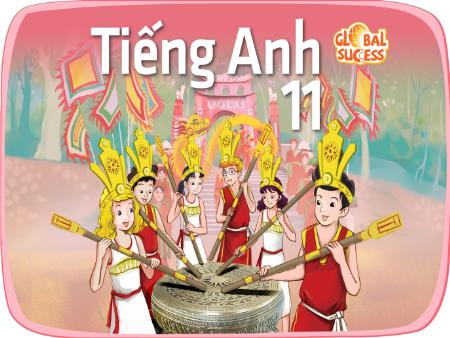Bài giảng Tiếng Anh 11 (Global Success) - Unit 2, Lesson 1: What is a generation gap?
Bạn đang xem tài liệu "Bài giảng Tiếng Anh 11 (Global Success) - Unit 2, Lesson 1: What is a generation gap?", để tải tài liệu gốc về máy hãy click vào nút Download ở trên.
Tóm tắt nội dung tài liệu: Bài giảng Tiếng Anh 11 (Global Success) - Unit 2, Lesson 1: What is a generation gap?

WARM-UP LISTING GAME - Work in 2 groups. - Each group is given a board pen - Write as many words connected to the theme “ A long and healthy life” as possible ( each student writes one word/ phrase) - The team with more correct word is the winner. Unit 2 Unit The generationFAMILY gap LIFE LESSON I GETTING STARTED What is a generation gap? PRESENTATION generation gap (n.ph.) / ˌdʒenəˈreɪʃn ɡổp/ the difference in attitude or behaviour between young and older people that causes a lack of understanding PRESENTATION behaviour (n) /bɪˈheɪvjə(r)/ the way that somebody behaves, especially towards other people PRESENTATION nuclear family (n.ph.) /ˌnjuːkliə ˈfổməli/ a family that consists of father, mother and children, when it is thought of as a unit in society PRESENTATION extended family (n.ph) /ɪkˌstendɪd ˈfổməli/ a family group with a close relationship among the members that includes not only parents and children but also uncles, aunts, grandparents, etc. PRESENTATION follow in somebdy’s footsteps (idiom) to do the same job, have the same style of life, etc. as somebody else, especially somebody in your family PRESENTATION Vietnamese Form Pronunciation Meaning equivalent 1. generation gap / ˌdʒenəˈreɪʃn the difference in attitude or behaviour between young and khoảng cỏch thế (n.ph.) ɡổp/ older people that causes a lack of understanding hệ 2. behaviour (n) /bɪˈheɪvjə(r)/ the way that somebody behaves, especially towards hành vi other people 3. nuclear family /ˌnjuːkliə ˈfổməli/ a family that consists of father, mother and children, when gia đỡnh hạt (n.ph.) it is thought of as a unit in society nhõn 4. extended family /ɪkˌstendɪd a family group with a close relationship among the gia đỡnh nhiều (n.ph) ˈfổməli/ members that includes not only parents and children but thế hệ also uncles, aunts, grandparents, etc. 5. follow in to do the same job, have the same style of life, etc. as nối nghiệp/ kế somebody’s somebody else, especially somebody in your family nghiệp ai footsteps (idiom) PRESENTATION 1 Listen and read. PRESENTATION 1 Listen and read. Ms Hoa: Good morning, class. Today, we’ll talk about the generation gap. So, what is the generation gap? Mark: Well, I think it’s the difference in beliefs and behaviour between young and older people. Ms Hoa: You’re right, Mark. So, is there a generation gap in your family? Mark: Not really, Ms Hoa. I live in a nuclear family with my parents and brother. We understand each other quite well though we still argue over small things. Ms Hoa: Right. We can’t avoid daily arguments. What about you, Mai? Mai: Well, I live with my extended family, and I have to learn to accept the differences between the generations. Ms Hoa: That’s a good point. Can you give us an example? Mai: Well, my grandparents hold traditional views of male jobs and gender roles. For example, my grandfather wants my brother to be an engineer, but my brother hopes to become a musician. And my grandmother thinks women have to do all the housework. Ms Hoa: How about your parents? Do they share your grandparents’ views? Mai: No, they don’t. They think that we should follow our dreams. They give us advice, but never force us to follow in their footsteps. Ms Hoa: Thank you, Mai, for sharing your experiences. You must respect your parents and grandparents, but you should also express your opinion. Now let’s continue our discussion with . PRACTICE 2 Read the conversation again. Tick (✓) the true information about Mark and Mai. Mark Mai 1. has some arguments over small things with family members 2. lives with grandparents who have traditional views 3. lives in a nuclear family 4 has parents who don’t force their children to follow in their footsteps. PRACTICE 3 Find words or phrases in 1 that have the following meanings. 1. all people who were born at about the same generation time __________ 2. a family that consists of a father, a mother, and (a) nuclear family children __________ 3. a family that includes not only parents and __________(an) extended children but also uncles, aunts, grandparents, etc. family 4. disagreements about things __________arguments PRACTICE 4 Complete the text based on the conversation in Task 1. Use the correct form of the verbs in brackets. 1. Mai lives with her extended family, and she has to/ should learn to accept the differences between the generations. 2. Mai’s grandmother thinks women have to/ should do all the housework. 3. Mai’s parents believe that children must/ should follow their dreams. 4. Ms Hoa thinks that children have to/ must respect their parents and grandparents. PRODUCTION Role play - Ss work in groups of 5. - In each group, one student plays the role of grandparent , two students play the role of parents and two students plays the role of children - Each group thinks about a situation ( clothes choice/ music taste, ect.) that shows the differences among generation and creates a short role play about the differences with suitable solutions. - 3 minutes to prepare for the role play - 2 minutes for a performance CONSOLIDATION 1 Wrap-up What have you learnt today? • Some lexical items about the generation gap • Reading for specific information • Modal verbs CONSOLIDATION 2 Homework • Do exercises in the workbook. • Prepare for Lesson 2 - Unit 2. • Prepare materials for the project in lesson 8 Website: hoclieu.vn Fanpage: facebook.com/www.tienganhglobalsuccess.vn
File đính kèm:
 bai_giang_tieng_anh_11_global_success_unit_2_lesson_1_what_i.pptx
bai_giang_tieng_anh_11_global_success_unit_2_lesson_1_what_i.pptx